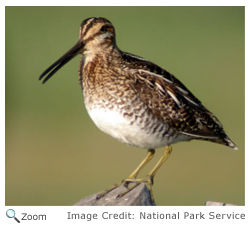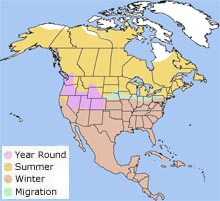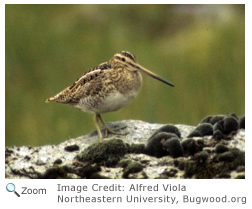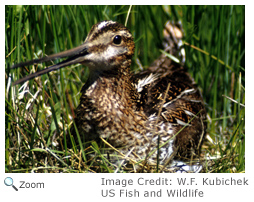Characteristics
 The common snipe is a meduim-sized wading bird with a long, straight, pointed, black bill. It has a brown body with black bars, a striped head and back and a white belly.
The common snipe's legs are shorter than most wading birds' legs. The common snipe is a meduim-sized wading bird with a long, straight, pointed, black bill. It has a brown body with black bars, a striped head and back and a white belly.
The common snipe's legs are shorter than most wading birds' legs.
Range
 The common snipe breeds from Alaska to Newfoundland south to the mid-United States. It winters north from northern South America to British Columbia, the northern Gulf states and Virginia. It is also found in Europe, Northern Africa and Asia. The common snipe breeds from Alaska to Newfoundland south to the mid-United States. It winters north from northern South America to British Columbia, the northern Gulf states and Virginia. It is also found in Europe, Northern Africa and Asia.
Habitat
 Common snipe can be found in wet grassy areas of freshwater marshes, ponds, flooded meadows, fields and occasionally, salt marshes. Common snipe can be found in wet grassy areas of freshwater marshes, ponds, flooded meadows, fields and occasionally, salt marshes. | |
|
Diet
The long, pointed bill of the common snipe helps it probe in the mud for snails, small crustaceans, insects, larvae and earthworms. It also eats some plant matter.
Life Cycle
 The male arrives at the breeding grounds first and stakes out a territory. To attract a mate he flies and dives in the air and makes a loud drumming noise as air passes through his tail feathers. The female lays four eggs in a grass-lined depression in a grass tussock. The chicks hatch after 18-20 days and fledge when they are 19-20 days old.
Behavior
The common snipe usually stays hidden in the grass, but if it is startled it will burst out from its cover and fly in a zig-zag pattern to evade predators.
|